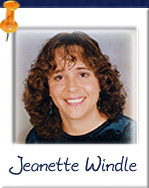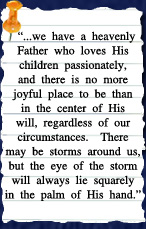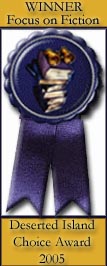


|
Focus on Fiction is pleased to feature Jeanette Windle Jeanette spent most of her life in South America, where she canoed in jungle rivers, hiked the steep Andes mountain trails, and swung from vines off cliffs into huge pools of water below. She and her family--husband, Marty, and four kids--now live in Miami, Florida. Jeanette has written two adult suspense books, The DMZ and CrossFire, and was awarded the 2002 Mabel Meadow Staats Award by the North American Writer's Association. She regularly leads local writer's seminars and conferences and is a consulting editor for two magazines.
|
|
Focus: Jeanette, you've written a number of young adult fiction stories and two adult fiction books. Can you tell us how many books in total you have in the Christian market? Jeanette Windle: I have eleven books total in the Christian market with another adult political/suspense novel just finished and due out this spring. Focus: Your two adult fiction books, The DMZ and Crossfire, are some of the most pulse-threatening, incredible stories I've ever read. Can you give our readers a brief synopsis of each? Jeanette Windle: In CrossFire, a missing helicopter and tons of hijacked cocaine are just part of the maelstrom awaiting Sara in her new life. Following a whirlwind romance and impromptu wedding, she is whisked off to her husband's palatial family estate in Bolivia. But Sara soon opens a Pandora's box of questions surrounding the Cortez family's billion-dollar business, becoming ensnared in a deadly clash between her new family, a drug cartel, and the DEA. CrossFire catapults the reader into an all-too-real world of America's counternarcotics war in Latin America.The DMZ explores the relationship between the Islamic fundamentalist groups and the guerrilla warfare in Colombia. More than a decade after the end of the cold war has chilled the Marxist rebel movements around the world, one hot spot remains-Colombia. The inexplicable loss of three major U.S. assets draws the attention of the world to the Colombian demilitarized zone. Are the local Colombian rebels responsible? Or is a deadly Middle Eastern secret cloaked by the jungle canopy of the DMZ. Among the contingent of politicians and media headed for the DMZ is reporter Julie Baker, whose parents had been missionaries in Colombia. Old hurts and terrors resurge as she revisits the place of her birth-and her parents' deaths. When Julie's own abduction by guerrillas triggers a time bomb that has been ticking under the feet of the U. S. for a decade, she is left with more questions than answers. With the fate of two countries resting in her hands, Julie must put aside her own terror to face just what God's call to sacrifice will mean for her past and her increasingly uncertain future. Focus: You have been questioned several times by the US Government about your detailed knowledge of information considered "classified." What was the outcome of these questionings and how did these individuals feel about your books being published? Jeanette Windle: Actually, much like Tom Clancy, I have been questioned by government sources in the writing of both CrossFire and DMZ as to where I got my research and information theoretically 'classified'. Without going into details, I was able to establish exactly where my information came from and that none was from a 'leak' within a government agency. I will say that, once satisfied, I have found members of government agencies extremely courteous and that it has actually opened up a lot of research doors for me. U. S. government personnel ranging from DEA, State Department, U. S. Southern Command, military intelligence, law enforcement and others have read CrossFire and DMZ, both in the manuscript stage and after publication. Not only have they had valuable input, but I am happy to say that they have all been happy with the accuracy and reality of the books, and they have been the source of some of my most prized 'fan mail'. Focus: Can you give us an estimate of the hours you spent researching and writing The DMZ and CrossFire? Jeanette Windle: I could not even begin to estimate. Each project was about 18 months from beginning research to finish. Focus: Rumor has it that a sequel to CrossFire is coming out next year. Can you confirm this? Jeanette Windle: Yes, I have actually just finished the sequel to CrossFire, Tentatively titled 'CrossHairs' (as in a sniper's scope), it is scheduled to be released spring of 2004. Focus: When did you discover your love of writing? Jeanette Windle: The truth is, we did so much writing growing up at a missionary kids' boarding school, I didn't realize how much I loved writing until it was no longer part of my daily life as a young missionary wife in rural Bolivia. That is when I began writing for personal enjoyment and realized how much a part of me it was. The result was my first children's novel, Kathy and the Redhead. Jeanette Windle: I would agree. Writing is actually extremely hard work, a mind-numbing, hair-pulling, excruciating process of creation to which the birthing of ones own children pales, and when I get started on a new book I always kick myself for getting myself into it again. But like painting or music, the gift of writing is something creative born in you that just has to come out. I always think of that verse in Jeremiah (20:9) where he talks of God's word being in him like a fire, and even when he doesn't want to, he has to let it out. That is kind of the way it is with writing. Like any art form, a true writer is born to write. I always tell want-to-be writers 'if you can keep from writing, do. It's a hard an unforgiving field; if you have to write, whether it's published or not, then you're a writer, and like a musician or artist, you can't be anything but.' And it does feel wonderful after all the work of birthing the world and characters and message of a new book to hold it in your hands and see the finished product. That's what makes it worth starting all over again.
Jeanette Windle: 1) Persistence--simply putting one foot in front of the other until the project's done. 2) Commitment to sit and write whether you feel like it or not. 3) A willingness to receive criticism and always be striving to improve one's writing. Focus: You were raised as a child of missionary parents in Columbia, and then spent fifteen years in Bolivia as a missionary with your own family. How have your life Jeanette Windle: Everything in my life has played a part in my writing. The experiences of my life as child and adult, the paths of spiritual growth and faith I have traveled, all run as threads through the pages of my various books. If any meaningful experience of my life has not yet made it into one of my books, it probably will at some future point. Focus: You've been quoted as saying: "For all the turmoil and conflict and pain in our world, this universe DOES make sense and has both a purpose and a loving Creator." This conviction could be shared in many forms of writing. How did you come to choose fiction as your medium? Jeanette Windle: We can assert intellectually our belief in a spiritual truth, even share how God revealed it in our own lives--and hope that our readers will agree with us. But when we weave that same truth into the pages of a book, we are carrying our reader into a world where he or she can experience that truth, feel along with our characters the pain of betrayal, the joy of friendship, the darkness of injustice, the despair of evil and the hope of God's righteousness and power emerging triumphant. In essence, live the spiritual journey of the protagonists--and author--along with them instead of simply being told about it. Dozens of books could be written on what is happening in Latin America and around the world and its implications for our own nation and society. By using a fiction canvas on which to paint a very real political and social scenario, I can bring together many of the players in these life dramas I've known and loved over the years. The various factions in the drug and guerrilla warfare. The civic leaders and pastors gunned down for making a stand in Colombia. The ordinary people torn between the different sides of conflict or driven out of their homes by civil war. The child soldiers with their cold, dead eyes and lost dreams. Personal friends who have spent months and years in guerrilla captivity. In letting readers see through their eyes, I can help them understand and feel the reality of their world and situation as no non-fiction book could, and, it is my prayer as well, bring readers through the spiritual pilgrimage of the characters, to come to a closer understanding and relationship with a loving Creator God who does have a purpose for this universe and each of our lives. Focus: Has your writing style been compared to other authors in the Christian or secular market? Jeanette Windle: In the secular market, to Tom Clancy, John Grisham, and M. M. Kaye. I can only hope someday to reach their level of professionalism and top-quality literature. Focus: In addition to being a wife, mother, missionary, and author, you've now added the title 'mentor' to your list of roles. Can you tell us about your mentorship of indigenous Christian writers? Jeanette Windle: I work with training indigenous Christian writers from a number of countries, in both English and Spanish. First by speaking at international writers' conferences, then by receiving manuscripts from students and working with them by email to bring manuscripts to a publishable level. I have taught seminars in Mexico, Bolivia, Panama, Ecuador, Miami, Philippines, England and Spain as well as working with students from a number of Eastern European and other Spanish-speaking countries as well. Focus: How can your readers and fans encourage you? Jeanette Windle: By praying for my ministry, writing, and family--that God's message will be what flows through in each of these areas. But my biggest prayer is for the body of Christ and especially its leaders in places like Colombia, Pakistan, Nigeria and so many others where I have personal friends who face terrorism on a daily basis and are standing for their faith under it. Focus: Is there anything else you would like your readers to know? Jeanette Windle: If there is any message above all I pray readers will take away from my books, it is this: 1) The absolute sovereignty of God: The ultimate safety of ourselves, our families and our country does not lie in anything we can do, but in the sovereign hand of God. 2) God's call to sacrifice: The aspiration of a child of God should never be safety, but service and sacrifice. Christ's directive in Matthew 10:38 is as true today as it was 2000 years ago. ' . . . anyone who does not take his cross and follow me is not worthy of me.' Maybe that sounds like a joyless message to leave, but it is not, because we have a heavenly Father who loves His children passionately, and there is no more joyful place to be than in the center of His will, regardless of our circumstances. There may be storms around us, but the eye of our storm will always lie squarely in the palm of His hand. As I heard one preacher say not long ago, "Safety is not in the absence of danger, but the presence of God".
|












© Focus on Fiction, 2003-2005 All Rights Reserved. Site maintained by PulsePoint Design. Direct questions or comments here
| Home | Upcoming Author Interviews | Past Author Interviews | Christian Fiction Reviews | About Us | | FAQ’s | Contact Us | Links |